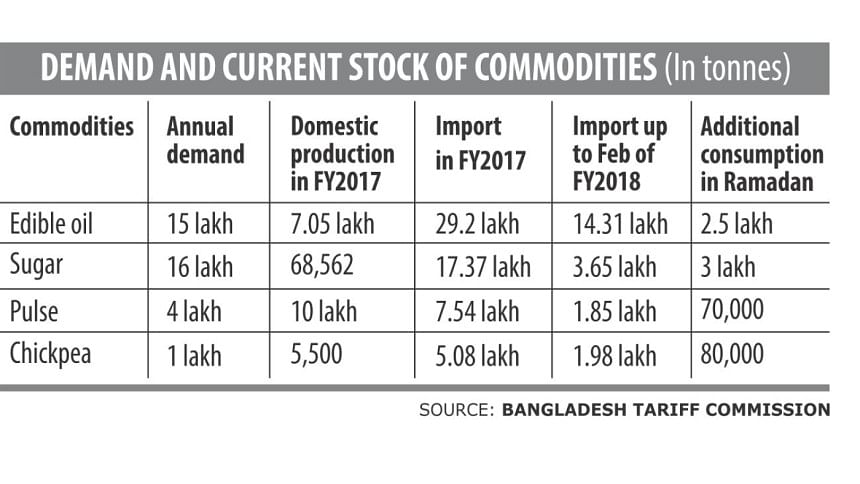Traders suggest ways to arrest price spiral in Ramadan

Traders yesterday urged the government to control the transport fares, solve the Chittagong port crisis and stop the depreciation of taka to arrest the price spiral of basic commodities before and during the month of Ramadan.
They also committed to not hike the prices of basic commodities on the occasion of Ramadan at a meeting with Commerce Minister Tofail Ahmed held at his secretariat office in Dhaka.
A section of unscrupulous traders make a hefty profit ahead of Ramadan by creating an artificial crisis of basic commodities, the demand of which swells during the Muslim holy month.
To prevent such a situation this year, Ahmed called traders, importers, police, secretaries from different ministries and representatives from government agencies and departments to know about the current stock and price situation of the commodities.
“The transport cost has almost doubled over the last three months due to a weight limit in carrying goods by trucks,” said Mostafa Kamal, chairman of Meghna Group, a leading basic commodity goods seller, at the meeting.
Previously, the trucks could carry 20 tonnes of goods at a time.
But from December last year, the Road Transport and Highways Division said a six-wheeler truck will be allowed to carry at best 22 tonnes, including the weight of the vehicle and goods.
As a result, now, the trucks, which weigh 9 tonnes, can carry 13 tonnes of goods at most.
“So the same quantity goods have to be carried in two trucks. This move affected the price level of commodities,” Kamal said.
Before the weight limit came into effect, the transport owners used to take Tk 15,000 for carrying a truck of goods from Dhaka to Dinajpur. But now, they are charging Tk 22,000 to Tk 25,000.
Kamal went on to urge the government to lift the weight limit.
Shafiul Ather Taslim, a director of TK Group, another basic commodity trading company, urged the government to instruct the Chittagong Port Authority to release the goods-laden ships on a priority basis so that the importers need not to pay for overstaying in the port.
He also requested the government to allow goods-laden trucks to ply on the Dhaka streets during daytime for the month of Ramadan to ensure steady supply of basic goods.
Badrul Hassan Chowdhury, joint director of the National Security Intelligence, urged the mill owners to release the goods from the mill gates to wholesale buyers as soon as possible so that there are no delays, which go on to impact the prices of goods. Sometimes, wholesale buyers have to wait for three days for the release of goods from the mills even after settling the order with the owners. But, by this time the prices of basic commodities already go up for the disruption in supply.
Rabiul Alam, secretary general of the Bangladesh Meat Traders' Association, said the prices of beef will be as low as possible because Bangladesh is self-sufficient in meat production. “We could have sold beef at Tk 300 a kg were there no Rohingya crisis,” Alam said. Since India stopped supplying cows to Bangladesh, Myanmar became a major source for cattle. But, the supply of cattle from Myanmar also stopped due to the Rohingya crisis in the bordering areas like Teknaf, he said.
“Still, the price of beef will remain low,” he added.
The commerce minister also assured that the prices of basic commodities will not go up during Ramadan as the supply in the local markets is higher than the demand.
Ahmed sought cooperation from the businessmen for keeping the prices of basic commodities low so that the image of the government does not tarnish ahead of the next general election, due to be held in December.
Currently, the prices of some basic commodities like sugar, edible oil, onion and garlic remained stable even after the fluctuation of US dollars against the local taka, said Golam Moula, general secretary of Moulvi Bazar Babosayee Samity, a major basic commodity selling market in Dhaka.
Sometimes, the price gap between the mill gates and wholesale rate for sugar and edible oil is between Tk 20 to Tk 25 a kg. “This is abnormal,” Moula said, while calling upon the government to minimise the gap.

 For all latest news, follow The Daily Star's Google News channel.
For all latest news, follow The Daily Star's Google News channel. 



Comments